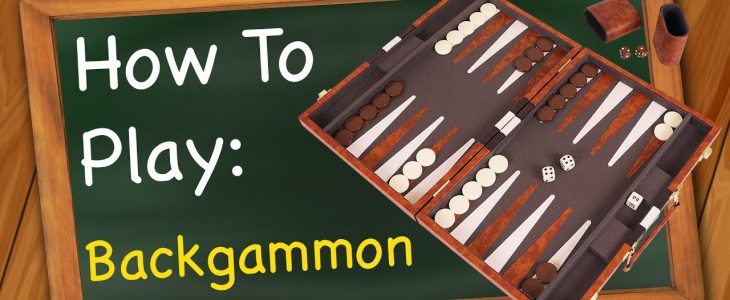
Introduction to Backgammon
Backgammon is a board game that has been around for centuries. It is thought to have originated in the Middle East, and it is still very popular there. The game is played with two players, each with 15 checkers of their own color. The objective of the game is to move all of your checkers around the board and off the board before your opponent does.
The game board consists of 24 triangles, called points. The points are numbered from 1 to 24, starting with 1 in the player’s home court. A player may not move their checkers onto a point occupied by two or more opposing checkers. To start the game, each player rolls a die. The player who rolls the higher number moves first using both dice. For example, if one player rolls a 4 and the other rolls a 3, then the player who rolled the 4 would go first.
If you roll doubles, you get to move four times for that turn instead of just two. And if you happen to roll three doubles in a row, that’s called “getting backgammoned” and your opponent can take away one of your checkers as punishment!
Once you’ve moved all your 15 checkers off the board, you’ve won! But beware – if your opponent gets to remove all their checkers first, they win instead.

Rules of the Game
1. The game of backgammon is played on a board consisting of twenty-four narrow triangles called points.
2. The board is divided into four quadrants of six points each.
3. A player’s home board is the quadrant containing points 1-6, and their outer board is the quadrant containing points 19-24.
4. Each player has fifteen checkers of their own color (traditionally white for one player and black for the other).
5. The checkers are moved around the board according to the rolls of two dice.
6. The main objective of the game is to move all of your checkers into your home board and then bear them off (i.e., remove them from the board).
7. Bearing off can only be done when all of a player’s checkers are in their home board.
8. The first player to bear off all fifteen of their checkers wins the game.
Equipment Needed for Playing Backgammon
In order to play backgammon, you will need a board, two sets of 15 checkers (traditionally, one set is black and the other set is white), and two dice. The board consists of 24 narrow triangles called points. The points are separated into four quadrants of six points each. The quadrants are referred to as the player’s home boards and outer boards, and the opponent’s home board and outer board. Each player has a home board on the right side of the board and an outer board on the left side.
The checkers are used to mark the progress of each player around the board. The object of the game is to move all of your checkers into your home board and then bear them off (remove them from the board).
Starting the Game
To start the game, each player places two checkers on their 24 point, three checkers on their 8 point, and five checkers on their 13 point. The remaining checkers are kept off-board in reserve. Play begins with each player rolling one die.
The player with the higher number moves first using both dice. If both players roll the same number, they must roll again until one player has a higher number. After that, the play proceeds as follows:
- The active player rolls both dice.
- The numbers rolled to determine how many points (spaces) the player may move their checkers forward. Checkers can only be moved to an adjacent point; they cannot “jump” over other checkers.
- The player must move both numbers rolled, if possible. For example, if a player rolls a 4 and a 6, they may move one checker four spaces, and another six spaces, or any combination that adds up to 10 points.
- If the player cannot move both numbers rolled (for example, if there are no checkers on the space indicated by one of the dice), then the player must forfeit their turn and wait for their next turn to roll again.
- A player can hit an opponent’s checker with their own during their turn; this is called “hitting” or “hitting off”.
- When a checker is hit off, it is placed in the bar (the area between the two home boards), and the active player must begin their next turn by re-entering that checker into their opponent’s home board before making any other moves.
- The game continues until one player has borne off all of their checkers, which marks them as the winner.
Strategies and Tips for Beginners
If you’re just getting started with backgammon, here are a few strategies and tips to help you on your way.
First, get to know the board and the pieces. The board is divided into 24 triangles called points, and each player has 15 checkers (pieces) of their own color. The object of the game is to move all of your checkers around the board and off the board before your opponent does.
To do this, you’ll need to roll two dice and use the numbers to move your checkers around the board. The numbers on the dice determine how many spaces you can move each checker. For example, if you roll a 5 and a 2, you can move one checker 5 spaces forward and another 2 spaces forward. Or, you could move one checker 7 spaces forward. It’s up to you!
If you land on a space occupied by your opponent’s checker, you can “capture” that checker by moving it off the board. To do this, you must first move your own checker onto that space, and then capture your opponent’s checker by moving it off the board as well – in other words, it goes “into jail.”
Remember that there are some special rules when you’re dealing with doubles (two of the same number on the dice) or hitting a blot (landing on an empty space where your opponent doesn’t have any checkers). These can be a little tricky, so it’s best to have an experienced player teach you the basics.
Finally, try to think ahead and plan your moves. This is especially important when playing against someone more experienced. If you can anticipate their moves and come up with a strategy to counter them, you’ll have a much better chance of winning!

Backgammon Variations
There are many different variations of backgammon, each with its own set of rules. The most common variation is called Acey-Deucey, which is played with only two checkers per player. Another popular variation is Nackgammon, which is played with three checkers per player.
Other variations include:
* Turkish Backgammon: Played with three checkers per player and a special board that has 24 points instead of 12.
* Greek Backgammon: Played with four checkers per player and a special board that has 24 points instead of 12.
* International backgammon: Played on a standard backgammon board with 15 checkers per player. This variation uses the Crawford Rule, which states that if one player wins two games in a row, the third game will be played for double stakes.
Which variation you play is up to you – there are no wrong choices! Just find a set of rules that you and your opponent(s) agree on and have fun!
Benefits of Playing Backgammon
Backgammon is a board game that dates back thousands of years, and it is still enjoyed by people all over the world today. The game is easy to learn and can be played by people of all ages. Backgammon offers many benefits, including:
– Developing strategic thinking skills: Backgammon is a game of strategy and planning. Players must think ahead to make the best moves and achieve victory. This helps to develop strategic thinking skills that can be applied in other areas of life.
– Improving problem-solving abilities: Backgammon requires players to solve problems in order to win. This helps improve problem-solving abilities and makes players better at solving real-life problems.
– enhancing memory and concentration: Backgammon requires players to remember previous moves and plan future ones. This enhances memory and concentration skills.
– promoting social interaction: Backgammon is typically played with others, which promotes social interaction and communication skills. It is also a great way to meet new people and make friends.
Conclusion
Backgammon is an exciting and thrilling game that can be enjoyed by players of all ages. It requires quick thinking, strategy, and luck to become a master at the game. With our backgammon basics for beginners guide we hope you have been enlightened on where to start with this fun board game. As with any skill having practice will help you improve your play over time so grab some friends or family and get playing!





